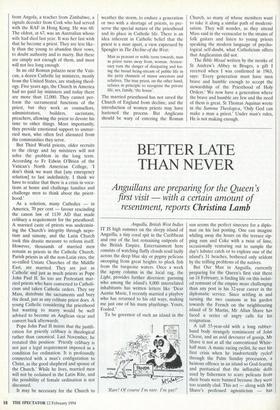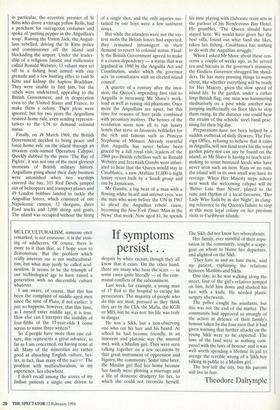BETTER LATE THAN NEVER
Anguillans are preparing for the Queen's first visit — with a certain amount of
resentment, reports Christina Lamb
Anguilla, British West Indies IT IS high summer on the sleepy island of Anguilla, a tiny coral spit in the Caribbean and one of the last remaining outposts of the British Empire. Entertainment here consists of watching fluffy clouds scud lazily across the deep blue sky or pygmy pelicans swooping from great heights to pluck fish from the turquoise waters. Once a week the agony column in the local rag, the Light, provides further diversion: guessing who among the island's 8,000 interrelated inhabitants has written letters like 'Dear Auntie Marie, I recently married a playboy who has returned to his old ways, making me just one of his many playthings. Yours, Fooled.'
To be governor of such an island in the Rare! Of course I'm rare. I'm gay!' sun seems the perfect sinecure for a diplo- mat on his last posting. One can imagine whiling away the hours on the terrace sip- ping rum and Coke with a twist of lime, occasionally venturing out to sample the day's lobster catch or to explore one of the island's 31 beaches, bothered only seldom by the trifling problems of the natives.
But Our Man in Anguilla, currently preparing for the Queen's first visit there on 18 February, is finding life on this isolat- ed remnant of the empire more challenging than any post in his 32-year career in the diplomatic service. Since settling in and turning the two cannons in his garden towards the French on the neighbouring island of St Martin, Mr Allan Shave has faced a series of angry calls for his resignation.
A tall 55-year-old with a long rubber- band body strangely reminiscent of John Cleese, and an avid devourer of gossip, Mr Shave is not at all the conventional White- hall man. A manic racing cyclist, he met his first crisis when he inadvertently cycled through the Palm Sunday procession, a heinous offence in an island so God-fearing and puritanical that the inflatable dolls used by fishermen to scare pelicans from their boats were banned because they were too scantily clad. This act — along with Mr Shave's professed agnosticism — has earned him the sobriquet 'the Godless Governor'. The situation has not been helped by Mr Shave's recent attempts to loosen the laws on homosexuality to bring Anguilla in line with the European Com- munity. 'It has been disastrous for my macho image,' says the Governor as he twirls his thin moustache, of the type often sported by the ladykillers of Auntie Marie's agony column.
Never one for an easy life, he has cracked down on crime, stretching the jail to bursting point with four inmates — dou- ble its usual occupancy — and raising eye- brows in a place so crime-free that the few doors do not have locks and the govern- ment building does not even have a door. The Governor uses his little-worn necktie to secure the shutters. In an attempt to shake the island government into action, he has created numerous committees, including one on toilets specifically created to remove an unsightly sanitary receptacle from the customs house.
Mr Shave is not the first to have trouble with the Anguillans, a people whom he describes as 'the most rebellious in the Caribbean' — a description that seems a little unfair when one sees the islanders politely stopping at one of Anguilla's five sets of traffic lights. The 16-mile-long, 2- mile-wide island has a bizarre history as the first colony in the world to revolt against independence, and the scene of a most embarrassing invasion by 300 British paratroopers and 49 London bobbies when the locals reversed the normal order of things by giving the soldiers sweets. The Anguillan revolution, as it has gone down in history, was sparked off by the British announcement in 1967 of home rule for a specially created federation of St Kitts-Nevis-Anguilla. To the islanders this meant oppression by the hated St Kittians in general and Robert (Poppa) Bradshaw in particular, the eccentric premier of St Kitts who drove a vintage yellow Rolls, had a penchant for outrageous costumes and spoke of 'putting pepper in the Anguillan's soup'. Raising the Union Jack, the Anguil- lans rebelled, driving the St Kitts police and commissioner off the island and blockading the airport. Under the leader- ship of a religious fanatic and millionaire called Ronald Webster, 13 valiant men set off in a fishing boat armed with one grenade and a few hunting rifles to raid St Kitts and kidnap the hapless Bradshaw. They were unable to find him, but the rebels were undeterred, appealing to the British Government, and in desperation even to the United States and France, to make them a colony. Thpir pleas were ignored, but for two years the Anguillans resisted home rule, even sending represen- tatives to the UN to demand colonial status.
Finally, on 19 March 1969, the British Government decided to bring peace and force home rule on the island through an invasion code-named Operation Calypso. Quickly dubbed by the press 'The Bay of Piglets', it was not one of the most glorious moments of British military history. Anguillans going about their daily business were astonished when two warships entered the bay, 315 Red Devils jumped out of helicopters and transport planes and 49 London bobbies landed to tackle the Anguillan forces, which consisted of one Napoleonic cannon, 12 shotguns, three Ford trucks and 2,000 sheep and goats. The island was occupied without the firing of a single shot, and the only injuries sus- tained by our boys were a few sunburnt noses.
But while the islanders were not the vio- lent mobs the British forces had expected, they remained intransigent in their demand to revert to colonial status. Final- ly the British Government agreed to make it a crown dependency — a status that was legalised in 1980 by the Anguilla Act and Constitution, under which the governor acts 'in consultation with an elected island council'.
A quarter of a century after the inva- sion, the Queen's impending first visit to Anguilla is increasing Mr Shave's work- load as well as raising old phantoms. Once more the Anguillans are upset, but this time for reasons of hurt pride combined with pecuniary motives. The heroes of the revolution seem now all to run luxury hotels that serve as favourite boltholes for the rich and famous such as Princess Stephanie of Monaco. Already resentful that Anguilla has never before been graced by a full royal visit, leaders of the 1969 pro-British rebellion such as Ronald Webster and Jeremiah Gumbs were infuri- ated to hear that the Queen would stay in Casablanca, a new Arabian $1,000-a-night luxury resort built by a Saudi group and run by Jamaicans.
Mr Gumbs, a big bear of a man with a flowing white beard and intense eyes, was the man who went before the UN in 1967 to plead the Anguillan rebels' cause, becoming the New York Times 'Man in the News' that week. Now aged 81, he spends
his time playing with elaborate train sets in the parlour of his Rendezvous Bay Hotel. He grumbles, 'The Queen should have stayed here. We would have given her the best villa, found out what food she likes, taken her fishing. Casablanca has nothing to do with the Anguillan struggle.'
When I asked Mr Shave about these con- cerns a couple of weeks ago, as he served tea and biscuits in the governor's mansion, the Godless Governor shrugged his shoul- ders. He has more pressing things to worry about, like whether everything will be ready for Her Majesty, given the slow speed of island life. In the garden, under a rather limp British flag, one man was hammering meditatively on a post while another was jumping ineffectually on floor tiles to stop them rising. In the distance one could hear the strains of the schools' steel band prac- tising for their big day.
Preparations have not been helped by a sudden outbreak of daily showers. The For- eign Office, refusing to believe that it rains in Anguilla, will not fund tents for the royal garden party nor can any be found on the island, so Mr Shave is having to teach tent- making to some bemused locals who have never seen such an item. Rain or no rain, the island will in its own small way have its revenge. When Her Majesty steps ashore next week the welcoming calypso will be 'Better Late than Never', played to the tune and rhythm of a local favourite, Der Lady Who Sails by in der Night', in clang- ing reference to the Queen's failure to stop at this most loyal colony on her previous visits to Caribbean islands.




















































 Previous page
Previous page